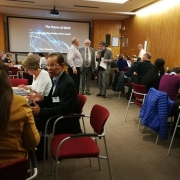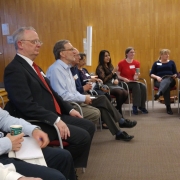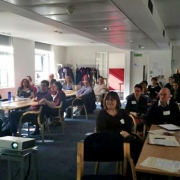Summary
2017 has been the tenth anniversary of the founding of NetIKX and this meeting was a celebration of this. The programme focused on the situation of knowledge and information professionals in 2017. Talks to set the scene were from Peter Thomson on major changes to the world of work and from Stuart Ward, Chair of NetIKX at its inception, who focused more closely on how KM and IM people can provide value in the workplace in this changing world. Then participants were invited to discuss the key ideas that they thought were the most relevant and put questions to a panel composed of people active and influential in our field.
What are the important trends in employment that we face and what is the role of communities like NetIKX that operate in this field? We looked back over the last ten years to set the scene for the changes we need to prepare for in the coming years. We also involved people from related organisations such as CILIP. ISKO UK and LIKE.
There were two introductory talks and first Peter Thomson looked at major changes to the world of work. Stuart Ward, Chair of NetIKX at its inception, focused more closely on how KM and IM people can provide value in the workplace in this changing world. Then, in a usual NetIKX syndicate session, participants were invited to discuss the key ideas that they thought were the most relevant. After this, to gain a wider perspective, questions based on these discussions were put to a panel composed of people active and influential in our field. These were David Haynes (Chair of ISKO UK), David Gurteen, David Smith (Government KIM Head of Profession), Karen McFarlane (Chair of the CILIP Board), Steve Dale and Noeleen Schenk (Metataxis Ltd, who has also been running a series of meetings on the future of knowledge and information management).
After a lively panel Q and A session, there was time for further discussion and networking over generous celebratory refreshments.
Speakers
Peter Thomson is an expert on the changing world of work and its impact on organisations, leadership and management. He regularly speaks on this topic at conferences and has worked with many groups of senior managers to inspire them to change their organisational culture. He headed up the HR function for Digital Equipment for Northern Europe for 18 years leading up to the dawn of the Internet. On leaving DEC, Peter founded the Future Work Forum at Henley Business School. He was Director of the Forum for 16 years, during which time he studied the changing patterns of work and the leadership implications of these trends. At the same time he formed Wisework Ltd, now a leading consultancy in the field of smart working. Peter is co-author, with Alison Maitland, of the business bestseller Future Work. He is also editor of a new book Conquering Digital Overload, which is about to be published. As a consultant and coach, he works with leadership teams and individuals to help them gain the maximum business benefit from new working practices. As a writer and researcher he is fascinated by the evolving role of leadership and management as we move into the ‘Gig Economy’.
Stuart Ward has been involved with NetIKX and its predecessors for over 15 years. With others he launched NetIKX 10 years ago and was the first Chairman. Stuart has wide experience in information and knowledge management and ICT, gained in business and as an independent consultant; he is interested in strategies that help to maximise the value of knowledge and information for organisations. Stuart began his career in IT and project management and, after developing a keen interest in improving the use of information in organisations, he became Director of Information Management at British Energy. In 1997 he established Forward Consulting to help organisations improve performance through information and knowledge management. He has worked with clients in both the public and private sectors. As an Associate of the IMPACT Programme, he managed their Information and Knowledge Exploitation Group from 1997 to 1999 and then again from 2004 to 2006. He was instrumental in developing the theme of the Hawley Committee: Information as an Asset with practical tools for use in business. In previous roles, Stuart has been a visiting lecturer at City University, Chairman of the Judging Panel for the British Computer Society Annual Business Achievement Awards, and chaired conference organising committees for Aslib. He is also currently an Associate of the College of Policing.
Time and Venue
2pm on Thursday 16 November, The British Dental Association, 64 Wimpole Street, London W1G 8YS
Slides
Not available
Tweets
#netikx88
Blog
See our blog report: The Future of Work for Information and Knowledge Professionals
Study Suggestions
None



